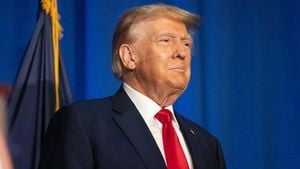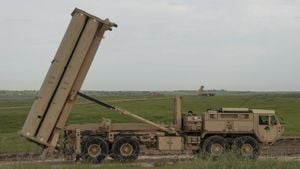North Korea's nuclear ambitions and its increasingly aggressive posture pose significant challenges for global diplomacy. Recent developments highlight the country's continuous advancement of its nuclear program, leading to heightened tensions with South Korea, the United States, and the international community at large.
On November 3, 2024, North Korean state media released a white paper asserting accusations against South Korean President Yoon Suk-yeol. The document claimed Yoon’s policies could potentially escalate the region toward nuclear war. The North Korean government criticized Yoon’s comments concerning militaristic cooperation with the United States and Japan, perceiving these alliances as provocations against the North.
The paper, compiled by the North Korean Institute for the Study of Enemy States, pointedly criticized Yoon's administration for abandoning peace initiatives established between the two Koreas. It noted, "The ever-worsening hostilities have led to the paradoxical consequences of North Korea accumulating nuclear weapons at an exponential rate and developing additional nuclear attack capabilities," according to state news agency KCNA.
The United States responded to rising tensions by deploying B-1B bombers for joint military exercises with South Korea and Japan, following North Korea's recent missile tests. Yoon’s hardline approach has resulted, according to experts, in heightened risks to South Korean security.
Earlier this month, North Korea showcased its military capabilities by launching the record-setting Hwasong-19 intercontinental ballistic missile (ICBM). This aggressive action led United Nations Secretary-General António Guterres to condemn North Korea, deeming the missile tests as violations of U.N. Security Council resolutions. Guterres emphasized the need for diplomatic engagement as the only pathway to sustainable peace and the denuclearization of the Korean Peninsula.
Kim Yo Jong, sister of leader Kim Jong Un, did not take Guterres's comments lightly; she publicly rebuked the U.N. chief, arguing his remarks unfairly aligned with the perspectives of the United States and its allies. Kim stated, "I express my strong dissatisfaction and categorically reject the unfair and prejudiced attitude of the U.N. secretary-general taking issue with the DPRK's just exercise of its right to self-defense." This statement came on the heels of North Korea’s latest missile test, which Kim’s government justified as necessary defense.
Despite the global criticisms and sanctions placed against it, North Korea remains steadfast, citing persistent external pressures as factors strengthening its resolve. North Korean officials claim the intensified military drills conducted by the U.S. and South Korea exacerbate tensions on the peninsula, making talks of disarmament seem far-fetched.
The cyclical nature of military posturing continues unabated. Recently, the North Korean government increased its efforts to develop its arsenal, including testing more advanced ballistic missile systems and ramping up military engagements with international allies. This included the controversial arms supply to Russia, which exacerbates existing tensions with the EU and U.S.
Historically, North Korea's weapons programs have drawn widespread condemnation, resulting in myriad sanctions from the international community. The situation has only worsened, especially after Pyongyang declared South Korea its "main enemy," effectively undermining any remaining hopes for peaceful reunification. Contradictions continually arise as North Korea simultaneously issues peace overtures and signals of military readiness.
Back at home, North Korea grapples with internal dissent amid rising economic difficulties. With the regime facing scrutiny, Yoon's approval ratings have plunged, partly due to public dissatisfaction with the government’s handling of foreign relations and domestic issues. This dual pressure could potentially lead to miscalculations—or, at the very least, erratic behaviors from North Korean leadership seeking to both control domestic narratives and display strength against perceived threats.
Internationally, the South Korean government is amplifying its calls for de-escalation. Recently, South Korea collaborated with the European Union to demand the withdrawal of North Korean troops deployed to support Russia’s operations amid the Ukraine war. The two allied voices present a unified front against Pyongyang's arms dealings and military cooperation with Moscow.
The latest tensions emerged against the backdrop of previous provocations, including the destruction of inter-Korean roadways and border structures by North Korean forces. Such actions not only signify military readiness but also serve as pointed messages to the South, reinforcing hostility rather than reconciliation.
The broader geopolitical ramifications cannot be overlooked, either. North Korea's aggressiveness has global security experts worried, seeing parallels between its actions and those of other regional actors pursuing similar military escalations. It creates unease not just within the immediate region but also among distant allies. The West is now tasked with developing strategies to both respond and de-escalate the situation across the Korean Peninsula.
Yet these retaliatory measures raise questions—what must happen next for North Korea, South Korea, and their neighbors to ease tensions? How much longer can this situation remain without significant international dialogue? The prospects for peace seem dim, with each missile launch and military exercise amplifying fears surrounding the stability and security of East Asia.
Despite the apparent deadlock, maintaining diplomatic channels remains imperative for all parties. The stakes couldn't be higher, and the consequences of miscalculations could spell disaster. Will international diplomacy find ways to bridge divides, or will pressure tactics foment even greater discord?



